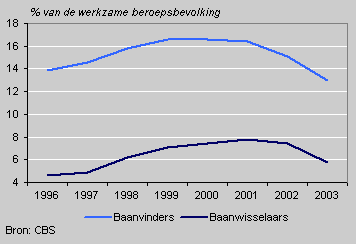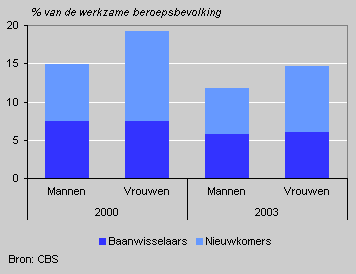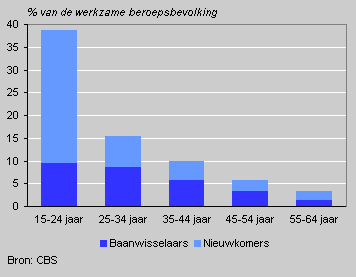Fewer movements on the labour market in 2003

More than 900 thousand people moved to a new job in 2003, 156 thousand fewer than in 2002. This figure includes people who change jobs and newcomers on the labour market. People with a new job included relatively many women and young people. Since 2001 the proportion of people with a new job in the employed labour force has dropped, as the economic slowdown has resulted in fewer movements on the labour market.
One eight workers found a new job
In 2003 more than 900 thousand workers in the Netherlands with a job of at least twelve hours a week had had this job for less than one year. This is a total of 13 percent of the employed labour force. People with a new job consisted of changers, namely 413 thousand people, and newcomers to the labour market, i.e. people who did not have a job before their present job.
People with a new job and changers in the employed labour force

Fewer changers in 2003
The labour market situation was favourable in the mid and late nineties. The proportion of people with a new job rose from 14 to 17 percent of the employed labour force in the period 1996 -1999. After that it stabilised, and in 2001 it fell again, as the growth in employment slowed down making fewer jobs available for newcomers on the labour market. In addition the economic slump resulted in fewer people changing jobs. The number of job changers has also been falling since 2002.
People with a new job by sex

More women than men have a new job
Fifteen percent of working women and 12 percent of working men had a new job in 2003. The number of job changers was around the same for men and women. More women than men are therefore newcomers on the labour market. One of the reasons for this is that many women step out of the labour market for a time when they have children.
People with a new job by age, 2003

Young people most mobile
Nearly 39 percent of young people had been in their present job for less than a year in 2003. Most of these were school-leavers, and students and pupils in their first job. People change jobs more of the up to the age of 35. Fewer people switch jobs at older ages: only 3 percent of workers aged between 45 and 54 moved from one job to another in 2003, compared with nearly 9 percent of 25-34 year-olds.
Sabine Lucassen